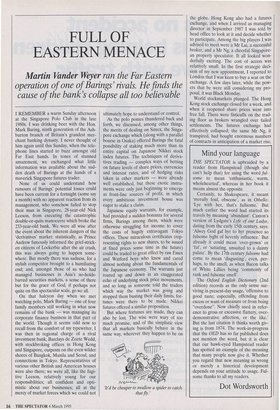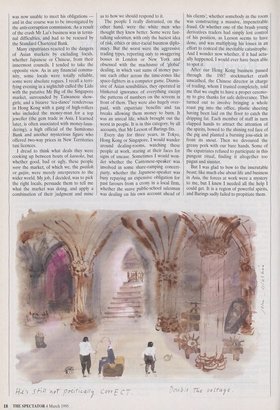FULL OF EASTERN MENACE
Martin Vander Weyer ran the Far Eastern
operation of one of Barings' rivals. He finds the cause of the bank's collapse all too believable
I REMEMBER a warm Sunday afternoon at the Singapore Polo Club in the late 1980s. I was drinking beer with the Hon. Mark Baring, ninth generation of the Ash- burton branch of Britain's grandest mer- chant banking dynasty. I never thought of him again until this Sunday, when the tele- phone lines started to buzz amongst old Far East hands. In tones of stunned amazement, we exchanged what little information was available about the sud- den death of Barings at the hands of a maverick Singapore futures trader.
None of us could understand how rumours of Barings' potential losses could have been current for a fortnight (some say a month) with no apparent reaction from its management, who somehow failed to stop their man in Singapore, 28-year-old Nick Leeson, from executing the catastrophic double-or-quits manoeuvre which broke the 233-year-old bank. We were all wise after the event about the inherent dangers of the `derivatives' market: statistically, as Prince Andrew famously informed the grief-strick- en citizens of Lockerbie after the air crash, this was always going to happen some- where. But mostly there was sadness, for a stylish competitor brought to a humiliating end; and, amongst those of us who had managed businesses in Asia's no-holds- barred securities markets, a sense of there but for the grace of God, if perhaps not quite on this spectacular scale, go we all.
On that halcyon day when we met watching polo, Mark Baring — one of four family members still working in what now remains of the bank — was managing its corporate finance business in that part of the world. Though it seems odd now to recall from the comfort of my typewriter, I was then in regional charge of a rival investment bank, Barclays de Zoete Wedd, with stockbroking offices in Hong Kong and Singapore, outposts on the even wilder shores of Bangkok, Manila and Seoul, and connections in Tokyo. Representatives of various other British and American houses were also there; we were all, like the fugi- tive Leeson, relatively young for our responsibilities; all confident and opti- mistic about our businesses; all at the mercy of market forces which we could not ultimately hope to understand or control.
As the polo ponies thundered back and forth, we discussed, among other things, the merits of dealing on Simex, the Singa- pore exchange which (along with a parallel bourse in Osaka) offered Barings the fatal possibility of staking much more than its entire capital on Japanese Nikkei stock index futures. The techniques of deriva- tives trading — complex ways of betting on future levels of share prices, currencies and interest rates, and of hedging risks taken in other markets — were already well established, but these exotic instru- ments were only just beginning to emerge as front-line sources of profit, in which every ambitious investment house was eager to stake a claim. Japanese equity warrants, for example, had provided a sudden bonanza for several firms, Barings among them, which were otherwise struggling for income to cover the costs of hugely extravagant Tokyo offices. These miraculous certificates (rep- resenting rights to new shares, to be issued at fixed prices some time in the future) could be traded to great effect by raw Essex and Watford boys who knew and cared almost nothing about the fundamentals of the Japanese economy. The warrants just roared up and down in an exaggerated echo of underlying stock price movements, and so long as someone told the traders which way the market was going and stopped them busting their daily limits, for- tunes were there to be made. Nikkei futures offered a similar proposition.
But where fortunes are made, they can also be lost. The wise were wary of too much promise, and of the simplistic view that all markets basically behave in the same way, wherever they happen to be on It'd be cheaper to swallow a spider to catch that fly.' the globe. Hong Kong also had a futures exchange, and when I arrived as managing director in September 1987 I was told by head office to look at it and decide whether to participate. Among the big players I was advised to meet were a Mr Lai, a successful broker, and a Mr Ng, a cheerful Singapore- an property speculator. It all looked won- derfully exciting. The cost of access was relatively small. In the first strategic deci- sion of my new appointment, I reported to London that I was keen to buy a seat on the exchange. A few days later, while the pow- ers that be were still considering my pro- posal, it was Black Monday.
World stockmarkets plunged. The Hong Kong stock exchange closed for a week, and when it reopened share prices went into free fall. There were fisticuffs on the trad- ing floor as brokers wrangled over failed settlements. The futures exchange had effectively collapsed; the same Mr Ng, it transpired, had bought enormous numbers of contracts in anticipation of a market rise, was now unable to meet his obligations — and in due course was to be investigated by the anti-corruption commission. As a result of the crash Mr Lai's business was in termi- nal difficulties, and had to be rescued by the Standard Chartered Bank.
Many expatriates reacted to the dangers of Asian markets by excluding locals, whether Japanese or Chinese, from their innermost councils. I tended to take the opposite view. As in any financial commu- nity, some locals were totally reliable, some were absolute rogues. I recall a terri- fying evening in a nightclub called the Lido with the putative Mr Big of the Singapore market, surrounded by Taiwanese show- girls; and a bizarre 'tea-dance' rendezvous in Hong Kong with a gang of high-rollers who included the money-man for a top jeweller (the gem trade in Asia, I learned later, is often associated with money-laun- dering), a high official of the Sumitomo Bank and another mysterious figure who offered two-way prices in New Territories taxi licences.
I dread to think what deals they were cooking up between bouts of karaoke, but whether good, bad or ugly, these people were the market, of which we, the gweiloh or gaijin, were merely interpreters to the wider world. My job, I decided, was to pick the right locals, persuade them to tell me what the market was doing, and apply a combination of their judgment and mine
as to how we should respond to it.
The people I really distrusted, on the other hand, were the white men who thought they knew better. Some were fast- talking salesmen, with only the haziest idea of risk, ethics or inter-racial business diplo- macy. But the worst were the aggressive trading types, reporting only to swaggering bosses in London or New York and obsessed with the machismo of 'global' dealing, in which vast sums of money pur- sue each other across the time-zones like space-fighters in a computer game. Dismis- sive of Asian sensibilities, they operated in blinkered ignorance of everything except the patterns of numbers on the screens in front of them. They were also hugely over- paid, with expatriate benefits and tax breaks allowing them money to burn. It was an unreal life, which brought out the worst in people. It is in this category, by all accounts, that Mr Leeson of Barings fits.
Every day for three years, in Tokyo, Hong Kong or Singapore, I would wander around dealing-rooms, watching these people at work, staring at their faces for signs of unease. Sometimes I would won- der whether the Cantonese-speaker was involved in some share-ramping concert- party, whether the Japanese-speaker was busy repaying an expensive obligation for past favours from a crony in a local firm, whether the suave public-school salesman was dealing on his own account ahead of his clients'; whether somebody in the room was constructing a massive, impenetrable fraud. Or whether one of the brash young derivatives traders had simply lost control of his position, as Leeson seems to have done, and was multiplying his losses in an effort to conceal the inevitable catastrophe. And I wonder now whether, if it had actu- ally happened, I would ever have been able to spot it.
After our Hong Kong business passed through the 1987 stockmarket crash unscathed, the Chinese director in charge of trading, whom I trusted completely, told me that we ought to have a proper ceremo- ny to give thanks for safe deliverance. This turned out to involve bringing a whole roast pig into the office, plastic sheeting having been laid on the floor to catch the dripping fat. Each member of staff in turn clapped hands to attract the attention of the spirits, bowed to the shining red face of the pig and planted a burning joss-stick in front its snout. Then we devoured the greasy pork with our bare hands. Some of the expatriates refused to participate in this pungent ritual, finding it altogether too pagan and sinister.
But I was glad to bow to the inscrutable beast; like much else about life and business in Asia, the forces at work were a mystery to me, but I knew I needed all the help I could get. It is a region of powerful spirits, and Barings sadly failed to propitiate them.



























































 Previous page
Previous page